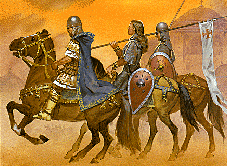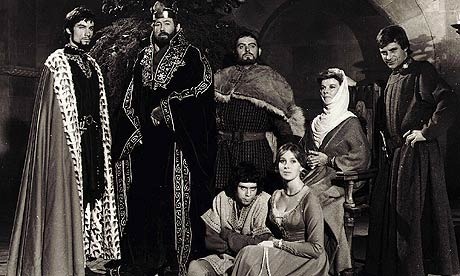What do you think?
Rate this book


640 pages, Paperback
First published June 20, 2013
In the stultifying heat of July the arrangements for the arrival of the French bridegroom and his army continued apace… From cellar to turret, Bordeaux prepared for Louis’ arrival. Hostels were swept out and decorated with banners and garlands. Cartloads of supplies rolled into the city from the surrounding countryside, together with herds and flocks for the slaughter. Seamstresses toiled over yards of pale gold cloth of scarlet, sewing a wedding gown fit for their new duchess and future queen of France. The train was hemmed with hundreds of pearls and the sleeves swept from wrist to ankle with decorative golden hooks to loop them back should they get in the way.
...[H]er women robed her in a gown of ivory damask, the gold laces pulled tight to emphasize her slender waist. A jeweled cap covered the top of her head, but her burnished hair remained exposed, the thick strands woven with metallic ribbons. Her nails were pink with madder stain and had been buffed until they gleamed…
…The pale canvases of the ordinary troops marked the French periphery, while the center blazed with the bright silks and golden finials of the high nobility and the Church. She fixed he eyes on the largest pavilion of them all: lapis blue and powdered gold with the red oriflamme banner fluttering in the hot breeze outside its open flaps… All along the riverbank, small boats and barges plied their trade, rowing supplies of food and drink to the host on the far bank. ... Banners decorated the lead barge, which was draped with a canvas awning to shade its occupants from the sun…
“Daughter, did you not hear me? You will be a great queen.”
“But no one has asked me. It has all been decided behind my back.” Her throat tightened. “What if I do not choose to marry Louis of France? What if I…what if I want to marry someone else?”
She also knew that [Louis’] father was called Louis the Fat and her vision kept filling with the sickening image of an overweight pasty youth.
She felt as if she were being tied into this marriage and even helpingher captors secure the knots [by participating in the wedding ceremony]…
“And how can you be Queen of France and a fitting consort for my son when you behave like a silly, frivolous girl?”
“What would my future have been had [my mother and brother] lived?”
“I learned not to think that way after I lost [my wife] Burgondie and the child in her womb,” he said. “It does no god. Al you can do is live each day in their honor.”
Her throat tightened and ached. He had missed the point, perhaps deliberately so. Had her brother not died, she would not have had to marry Louis … It made allthe difference.
…Louis took [Alienor] with all the vigor his fury lent him, uncaring that he hurt her, expending his temper on her body as if it were all her fault.
His gaze was predatory and amused. She tried not to show how much his direct stare perturbed her. … Alienor felt as if Geoffrey of Anjou had stripped her to her chemise in front of everyone, even though their exchange had been one of social formality. She was intensely aware of him in the room… … Even the thought of Geoffrey made her feel restless and hot. … All that charisma, virility, and danger. What would it be like to master a beast like that—to ride it?
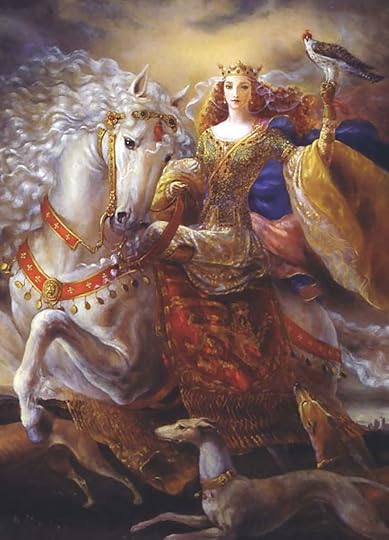
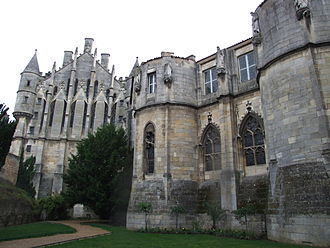
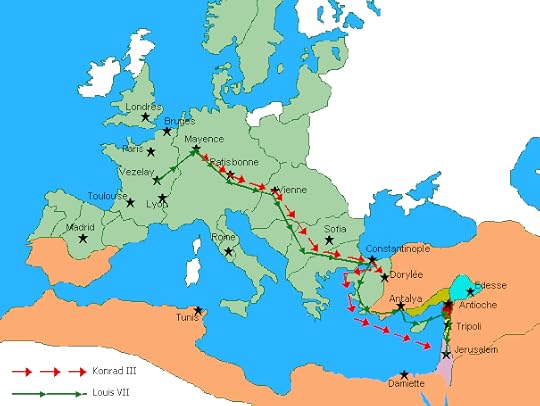
“All that remained were poignant memories, and she must face reality, not live on dreams.”The figure of Eleanor (or Alienor, as EC calls her here by her French name) was not new to me. I had already met her in the Elizabeth Chadwick’s superb William Marshal series, but that was an older version of Alienor of The Summer Queen.

